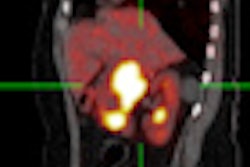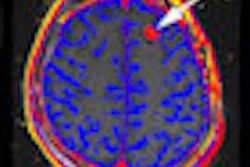A noninvasive PET imaging technique may identify lung cancers that respond best to tyrosine kinase inhibitors, according to research presented at the 14th World Conference on Lung Cancer being held in Amsterdam this week.
PET scans using radiolabeled erlotinib, a tyrosine kinase inhibitor, may enable radiation oncologists to better select patients with non-small cell lung cancer (NSCLC) for personalized treatment.
One marker that predicts tumor response to tyrosine kinase inhibitors is the activating mutation of the epidermal growth factor receptor gene of the tumor cells, according to presenter and principal investigator Dr. Idris Bahce, of the VU University Medical Center in Amsterdam. Patients who had an activating epidermal growth factor receptor mutation also had an increased tracer uptake, and proved to be more sensitive to treatment with erlotinib.
The study included 10 NSCLC patients, five with wild type epidermal growth factor receptor genes and five with activating mutations of the gene. Each was scanned twice using a procedure that included a low-dose CT scan, a 10-minute [15O] water dynamic PET scan, and a one-hour [11C] erlotinib dynamic PET scan.
Tumor uptake of [11C] erlotinib was significantly higher in the mutated group (median uptake [VT] = 1.70) than in the wild type group (median uptake [VT] = 1.18). This difference was not due to variations in tumor perfusion. Tracer [11C] erlotinib uptake correlated with tumor response to subsequent erlotinib treatment, as only high-uptake tumors responded to treatment, Bahce said.



















